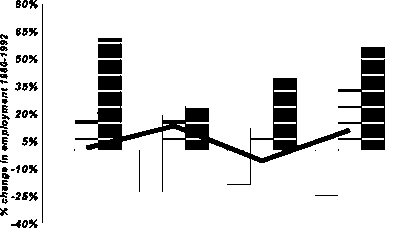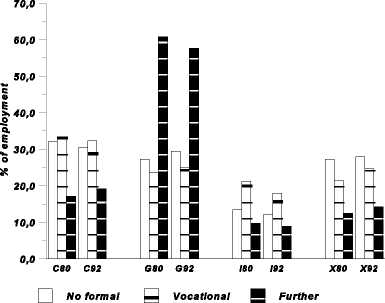Abbildung 3 Change in education and final
uses 1980-1992.

CGIX
No formal compared to average
Vocational compared to average
Further compared to average
Abbildung 4 Education and final uses
1980 and 1992.

Average
This generation effect alone will generate less employment for non-educated and more
employment for educated people, even if there were no other changes in the economy. Even
if neither domestic demand for goods and services, productivity and technology, nor foreign
specialization and import/export would change, the demographic development will create less
unskilled employment and more skilled employment. This appears also from table 1 and 2:
In 1992 the production of goods and services for all kinds of uses embedded less input of non-
educated and more input of vocational- and further education. From this it is not possible to
detect wether education has influenced the performance of the Danish economy.
However we can note an important stylized facts for Denmark: “The supply of low educated
labour is falling”. This can be seen as a supplement to the international fact about the demand
for low educated in section 1 above. And it is important to remember, that changes in supply
will generate changes in employment in itself (Groes 1982, Groes, Holm & Tranæs 1994).
Fitzenberger (1997) notes the changing supply from 1975 til 1990 in Germany; but conclude
a little cryptic: “..dass die Veranderungen in der Qualifikationsstruktur der Beschaftigung zum
grossen Teil durch Angebotsveranderingen kompensiert wurden und die Veranderunger in der
qualifikatorischen Lohnstruktur im internationalen Vergleich recht gering ausfallen”. Actual
employment is the result of demand and supply factors, and statistical recorded employment
for different skill groups can not be interpreted just as a result of the demand for labour. And
therefore shift in employment do not only reflect shifts in demand.
More intriguing information
1. Volunteering and the Strategic Value of Ignorance2. Philosophical Perspectives on Trustworthiness and Open-mindedness as Professional Virtues for the Practice of Nursing: Implications for he Moral Education of Nurses
3. Applications of Evolutionary Economic Geography
4. Mergers under endogenous minimum quality standard: a note
5. Why Managers Hold Shares of Their Firms: An Empirical Analysis
6. Firm Creation, Firm Evolution and Clusters in Chile’s Dynamic Wine Sector: Evidence from the Colchagua and Casablanca Regions
7. Estimated Open Economy New Keynesian Phillips Curves for the G7
8. The name is absent
9. The name is absent
10. The name is absent